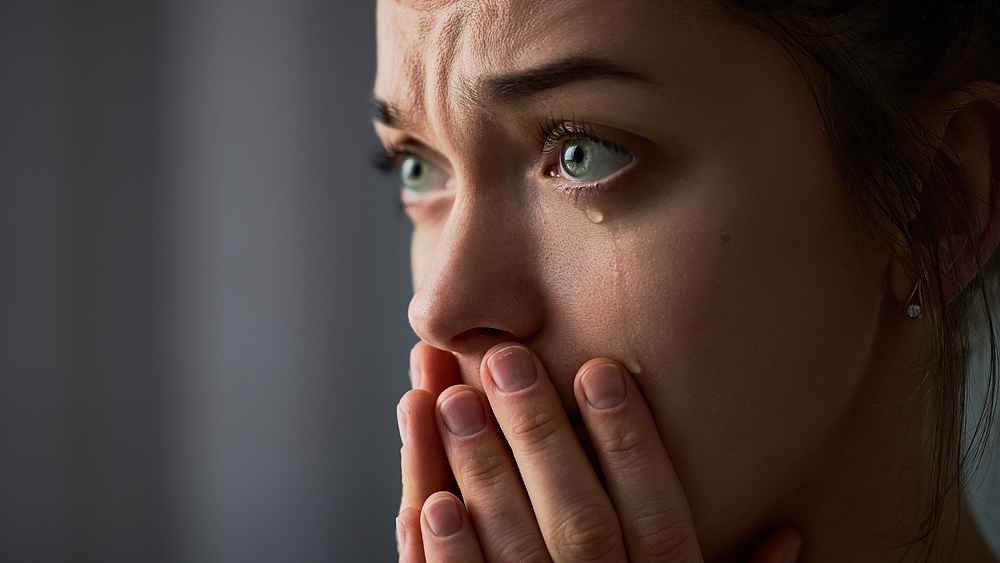Love-hate relationships are intoxicating in the worst way. They pull you in with passion, excitement, and intensity—then they leave you spiraling in confusion, self-doubt, and emotional exhaustion. You can’t quit, but you can’t stay, either. The push-pull keeps you hooked, but what you may not realize is how much it’s silently destroying you. Here are 15 brutal ways being trapped in a love-hate relationship is damaging you—and why it’s so damn hard to break free.
1. You Develop A Fear Of Speaking Up

Every time you tried to express your feelings, they flipped it back on you, accusing you of being dramatic, sensitive, or needy. So you stopped. You learned to swallow your emotions, to avoid conflict, to keep the peace at any cost. In a recent study published in Psychological Reports, researchers explored the strong link between perceived emotional invalidation and psychological distress, showing how invalidation can lead to fear of expressing emotions and long-lasting negative effects on relationships and mental health.
You start second-guessing yourself at work, with friends, even in new relationships. You overthink every word, every tone, every text. The relationship taught you that your voice wasn’t safe, and now that belief follows you even. It’s not just emotional—it’s a scar you carry.
2. You Normalize Toxic Behavior

When fights, insults, and emotional coldness become part of the routine, you start convincing yourself it’s normal. According to Psychology Today, people in toxic relationships often minimize red flags to cope with the instability. You tell yourself, This happens in every relationship,” or They didn’t mean it.” But deep down, you know something’s off.
This normalization rewires your brain to tolerate what should be intolerable. You accept breadcrumbs of affection as enough, and you let the bad days erase the good ones. The longer you stay, the harder it is to see the dysfunction for what it is. It’s not love—it’s survival mode.
3. You Lose Your Sense Of Self

When love feels like a rollercoaster, you stop knowing where you end and where the relationship begins. You adapt, shrink, and mold yourself to keep the peace, but each time you do, you lose a piece of who you are. Over time, you become unrecognizable—even to yourself. You wonder: Am I really like this, or is this just who I have to be to survive this relationship?
That identity erosion is slow but devastating. You start doubting your instincts, your preferences, even your values. That identity erosion in toxic relationships is well documented. According to research published in the Journal of Emerging Technologies and Innovative Research, toxic relationships can profoundly impact mental health by causing anxiety, depression, and especially low self-esteem. The constant criticism and manipulation in such relationships lead individuals to doubt their abilities and value, resulting in a loss of self-worth and identity over time.
4. Your Nervous System Stays On High Alert

Love-hate dynamics are unpredictable, and that unpredictability wires your body for stress. You live in a constant state of fight-or-flight, never knowing if the next conversation will be tender or explosive. According to Harvard Health, chronic stress like this can lead to anxiety, insomnia, and even long-term health issues. Your body isn’t designed to handle this kind of emotional chaos.
The adrenaline rush of the highs keeps you hooked, but the crashes leave you shattered. You start mistaking the intensity for passion, but it’s just trauma bonding in disguise. And the longer you stay, the harder it is to feel calm anywhere—your body forgets what safety even feels like.
5. You Start Doubting Your Reality

Gaslighting is the toxic glue that holds a love-hate relationship together. You raise a concern, and they make you feel crazy for noticing. You catch a lie, and they twist it until you’re the one apologizing. Over time, you stop trusting your perceptions—you question if you’re too sensitive, too emotional, too needy.
That’s the danger of being in a love-hate loop: you lose your grip on reality. As noted by Crystal Raypole and Sandra Silva on Healthline, gaslighting is a form of emotional abuse that causes victims to question their own beliefs, memories, and perceptions, leading to confusion and self-doubt that make it difficult to trust their instincts and leave the toxic relationship.
6. Your Boundaries Erode Completely

In a love-hate relationship, “no” doesn’t mean no. They push, you bend. They cross lines, and you redraw them further back, again and again. Eventually, you wake up and realize you have no boundaries left.
This erosion doesn’t just happen in the relationship—it leaks into your entire life. You start tolerating behavior from friends, coworkers, and even strangers that you would have once rejected. The relationship taught you that saying no isn’t safe, so you stop trying. And that’s how they keep you small.
7. Your Self-Esteem Tanks

At the start, they probably built you up—complimented you, admired you, made you feel like you were the center of their world. But once the cycle of highs and lows in, the criticism, the withdrawal, and the blame chipped away at your confidence. As explained by Vaishnavi Arora in a detailed research paper on psychological and emotional abuse, such abuse can fundamentally erode an individual’s self-esteem through mechanisms like internalization of negative messages, learned helplessness, and emotional dysregulation, leading to long-lasting damage to self-worth and identity.
You start believing you’re the problem, that you’re not lovable, that you somehow deserve this emotional rollercoaster. And even after the relationship ends, that damage lingers. It takes years to rebuild what they broke in months.
8. You Become Addicted To The Drama

It’s a twisted form of emotional conditioning—when the highs are so high, and the lows are so low, your brain gets hooked on the unpredictability. It feels like passion, but it’s just chaos disguised as chemistry. The adrenaline of the “make-up” moments feels addictive, and you start craving that intensity, even when you know it’s toxic.
This pattern wires your brain to associate love with instability. Healthy relationships feel boring by comparison, and you chase the highs even as they destroy you. It’s not love you’re chasing—it’s the chemical rush of surviving the storm.
9. You Neglect Your Own Needs

In a love-hate relationship, their needs take up all the space. You’re too busy managing their moods, their expectations, and their demands to even notice your desires. Your dreams get smaller, your joy gets dimmer, and you start living in reaction mode.
This self-abandonment isn’t just a side effect—it’s a strategy for survival. You learn to anticipate their needs so they don’t explode, and you stop asking for anything that might rock the boat. But over time, the cost is staggering: you forget how to take care of yourself entirely.
10. You Isolate From People Who Actually Care

Your friends and family saw the red flags long before you did—and when they tried to tell you, you pulled away. Maybe you felt embarrassed, maybe you defended the relationship, maybe you just didn’t want to hear it. But now, you’re more isolated than ever, trapped in a dynamic that thrives on keeping you alone.
The longer you stay, the more the isolation grows. You stop reaching out, stop sharing your struggles, and convince yourself no one else would understand. And that’s exactly what the love-hate cycle feeds on—keeping you tethered to someone who doesn’t deserve your loyalty.
11. You Learn To Expect Chaos

The unpredictability becomes your baseline—you stop expecting stability because it’s never been there. You brace for the next fight, the next cold shoulder, the next emotional withdrawal. It’s not just exhausting; it’s a form of emotional conditioning that wires you for hypervigilance.
Even when the relationship is “good,” you’re waiting for the other shoe to drop. That constant tension leaves you unable to relax, to trust, to feel safe. And that’s how love-hate relationships quietly break you down.
12. You Internalize The Blame

When the cycle keeps repeating—fight, make up, fight, make up—you start thinking maybe it is me. They tell you youtoo sensitive, too needy, too dramatic, and after a while, you start believing it. It’s not just self-doubt—it’s a full-on identity crisis.
You become so wrapped up in their narrative that you lose sight of what’s true. You carry the blame like a weight, apologizing for things you didn’t cause, and shrinking to avoid setting them off. It’s a toxic cycle that leaves you questioning your worth.
13. You Stop Trusting Yourself

When every instinct you have is met with dismissal, ridicule, or punishment, you learn to doubt your gut. You stop listening to the part of you that says this isn’t okay, and you override your inner wisdom to keep the peace. That self-betrayal becomes a habit—and it’s devastating.
Even after the relationship ends, you hesitate before making decisions, second-guessing every feeling and choice. The relationship didn’t just damage your confidence—it rewired your ability to trust yourself. And rebuilding that trust takes time, courage, and a lot of unlearning.
14. You Lose Time You’ll Never Get Back

This one hurts the most. The years you spent in a love-hate relationship—hoping, fighting, waiting for change—are years you can’t get back. You sacrificed time, energy, and parts of yourself you didn’t even realize you were giving away. And when you finally see it, it’s a grief that’s hard to put into words.
You wonder what you could have built, loved, or become if you’d left sooner. And while it’s not too late, the loss is real. It’s a wound that lingers long after the relationship ends.
15. You Start Believing This Is All You Deserve

The most insidious damage of all: the belief that this is just how love is supposed to feel. The highs, the lows, the emotional rollercoaster—it becomes your normal. You convince yourself that healthy love is a fantasy, and chaos is the price you pay for passion.
But here’s the truth: you deserve better. You deserve peace, stability, and love that doesn’t leave you doubting your worth. It’s not too late to choose differently. And that choice starts with believing you’re worthy of more than a love that hurts.

Abisola is a communication specialist with a background in language studies and project management. She believes in the power of words to effectively connect with her audience and address their needs. With her strong foundation in both language and project management, she crafts messages that are not only clear and engaging but also aligned with strategic goals. Whether through content creation, storytelling, or communication planning, Abisola uses her expertise to ensure that her messages resonate and deliver lasting value to her audience.


